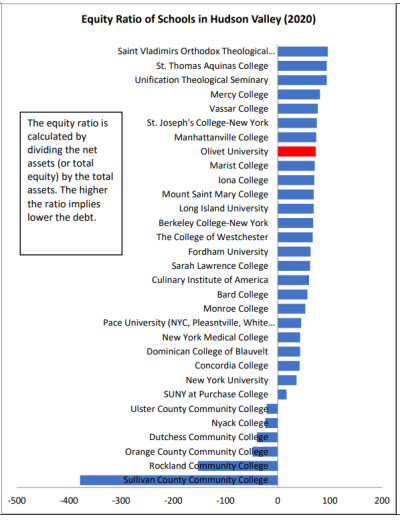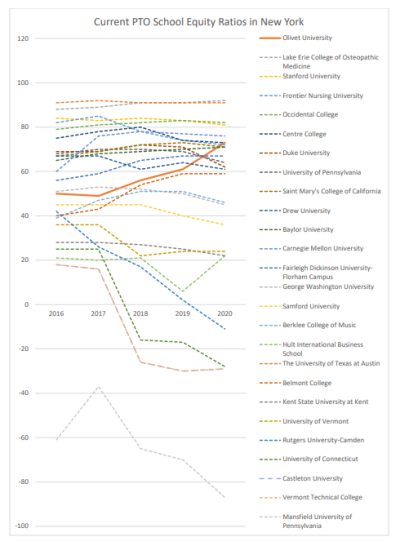New York education officials betray fairness and cancel Christian school
I’ve heard a lot about cancel culture but this is the first time that it hit me directly. Overnight the world turns against you, you become a social pariah, and worst of all – no one gives you a chance to speak, let alone share your side of the story. This is what is happening with Olivet University.
The narrative crafted by media outlets and a government agency is that the New York campus of our Christian school was “shut down” by the New York State Education Department (NYSED) due to insufficient resources to meet our mission and non-compliance of governance and internal control. There is a lot more to the story than this. What I simply ask for is a chance to set the record straight and separate truth from fiction, and facts from myths. This is not about me or even Olivet, it is about protecting the credibility of our dedicated students, faculty, and staff whose mission is to discover and spread the message of the Gospel.
Olivet University has served students in New York since 2012 when it was first granted permission to operate (PTO) by the New York State Board of Regents. The June 25, 2020 renewal application to operate physically in New York was extended multiple times and ultimately not extended further by NYSED on June 30, 2022. However, we believe NYSED’s determinations do not rest on a sound basis in reason and are inherently flawed.

How can the NYSED say our institution does not have sufficient resources to meet its mission when it is in better fiscal health than most other colleges and universities operating in the Hudson Valley, as well as most other out-of-state-institutions operating pursuant to PTOs based on data from the Integrated Postsecondary Education Data System (IPED).

The charts show IPEDs from June for 31 colleges and universities in the Hudson Valley Regents Region of New York State. Olivet ranks in the top 10 for equity ratio, which is a financial metric that measures the amount of leverage used by an organization. It is used to determine how an organization manages its debts and funds its assets. The fact that Olivet has a higher equity ratio than most comparable schools indicates that it uses less debt to finance its assets. To date, Olivet has invested over $70 million in its 1,000-acre property in the Hudson Valley community, including $40 million in renovations. These investments and publicly available IPED data refute the conclusion drawn by NYSED that Olivet lacks sufficient financial resources to fund its educational programs when its equity ratio is higher than comparable schools in terms of location and PTO status.

Moreover, the NYSED discounted the Manhattan District Attorney’s findings that Olivet has successfully overhauled its corporate governance and financial controls.
After the unfortunate events in 2018 when charges were brought against the school, Olivet was determined to make drastic changes and comply with the remediation process, which the DA’s office has sole discretion over. Olivet hired Crowe LLP, a third-party accounting and consulting firm, that has worked with the school since February 2019.
Under the supervision of the Manhattan District Attorney's office and guidance of Crowe LLP, Olivet planned and executed a remediation plan and sent the DA office quarterly reports. The Olivet Board adopted new By-Laws, Constitution, Code of Ethics, and Conflicts of Interest Policy for all campuses, personnel, faculty, and students nationally in consultation with Crowe’s non-profit governance experts to embody best practices that embraced systematic controls.
The New York County Supreme Court Justice Ruth Pickholz approved the remediation efforts, at the recommendation of the Manhattan’s DA Office, in February 2022 and allowed Olivet to re-plead to a misdemeanor charge. The DA and court considered Olivet’s actions and remediation of its financial controls and its governance successful. The court also issued a Certificate of Relief from Civil Disabilities to signal that the court did not wish the conviction to interfere with Olivet’s continued existence in New York state.
NYSED fails to assess Olivet based on all the above changes and judges the school on its past performance and not on its current standards of operations. It also failed to communicate with Olivet on what needed to improve despite continuous efforts by the school to engage in how to improve. The Department made its decision to not renew the PTO based on superficial information, politics, and negative media articles.
Regarding the 53 lawsuits against Olivet since 2017, these numbers were what Olivet had transparently self-reported to NYSED. The Department staff appears to equate the raw number of litigations alone is enough to determine Olivet’s finances as unsound. Yet if NYSED had made an effort to investigate the nature of the lawsuits, like the parties and dockets, it would discover there were only 12 dockets that reflected open matters; the rest had been settled, dismissed, or otherwise terminated. Furthermore, had NYSED done its duty of investigating the lawsuit, it would find that many of the dockets were connected to others on the list and constituted ancillary or related proceedings. For example, some cases had a judgment entered in one court, and then other dockets representing the filing of that judgment in other jurisdictions. For that reason, the 12 open docket numbers recited in the March 2021 response actually reflect only seven discrete matters. And as of now, even fewer than that remain open.
Finally, the fact that Olivet was sued does not give rise to any valid conclusion as to whether the lawsuits did or did not have merit. Olivet, of course, has a right to defend against claims it deems to be without merit. In sum, the numbers quoted by NYSED for the total number of lawsuits is a historic number not reflecting Olivet’s current situation and the cases' conclusions. NYSED seemingly made no attempt to examine the quality and nature of the litigation, as opposed to its quantity.
NYSED repeatedly made decisions without making an effort to understand the complexity of the issues. It has a prejudice for basing its decision on past and not current standards of operations using deficient reasoning and process. Taken as a whole, Olivet cannot help but call foul on NYSED’s biased and unsound decision.
It is regrettable that the state of New York, the Empire State that is iconic to America the land of religious freedom, is showing prejudice against a Christian institution.





















